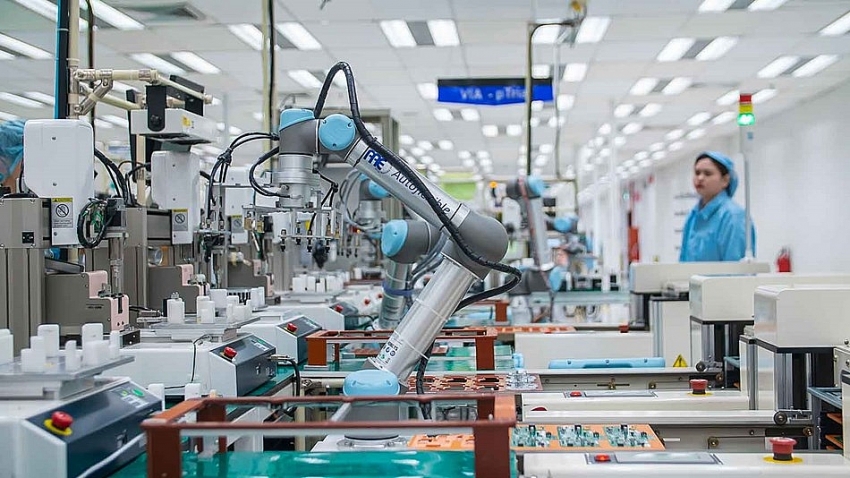Universal Robots: Leveraging automation to reduce workplace injuries
 |
| Automation technology can reduce most common causes of injury in manufacturing environments |
Automation technology can help increase productivity and reduce up to 72 per cent of the common causes of injury in manufacturing environments.
According to the Ministry of Labour, Invalids and Social Affairs, Vietnam recorded 3,349 occupational accidents from January to June 2020 with total deaths numbering 378.
The accidents were most prevalent in the manufacturing sector (27.41 per cent), construction (23.24 per cent), and services (12.35 per cent) while the remaining 37 per cent was spread across other sectors.
Most local manufacturers are currently facing a growing skilled talent shortage which strains their overall productivity and growth. At the same time, employers are also facing immense costs associated with workplace-related injuries.
“Cobots can perform tasks that may be dangerous or injury-prone for humans. With built-in safety features that slow the robot arm when a human enters its workspace, cobots can keep human colleagues safe from occupational injuries as they address repetitive and dangerous tasks in the manufacturing sector,” said James McKew, regional director of Asia-Pacific at Universal Robots.
| For more complex applications, Universal Robots has a comprehensive network of Certified System Integrators and Authorised Training Centres ready to support users with day-to-day operations after the initial installation. |
Universal Robots’ adjustable safety system allows companies to adjust a range of parameters to reduce the risks involved with implementing an industrial robot application.
These include limiting the force, speed, power, or momentum of the robot, or restricting its workspace using safety boundaries. Productivity gains, along with the inherently safe design of cobot solutions, signify this new automation technology could reduce up to 72 per cent of the common causes of injury in manufacturing environments.
“As we move closer to the vision of Industry 5.0 where man and machine work together on the smart factory floor, the need to consider the safety and compliance requirements of this new kind of workplace has become paramount. In a collaborative workforce, human and robots complement each other in their roles which offers significant opportunities to enhance manufacturing productivity, innovation, safety, and overall job satisfaction in the workplace,” said McKew.
McKew pointed out that companies can achieve a faster Return on Investment (ROI) by using cobots to free up workers’ time, allowing them to tackle higher productivity processes and ultimately acquire new skills.
Unlike traditional robots that require engineer-level programming, cobots are designed to make programming simple through human-machine interfaces (HMI) familiar to anyone who has used a smartphone.
For more complex applications, Universal Robots has a comprehensive network of Certified System Integrators and Authorised Training Centres ready to support users with day-to-day operations after the initial installation.
By eliminating the need for formal education in programming or robotics, such interfaces and capabilities make the skills gap and learning curve for using cobots diminishingly small.
Universal Robots encourages local manufacturers to adopt the perfect man and machine collaboration. With cobots, manufacturers in Vietnam need not fear the impacts caused by the growing skilled talent shortage.
The collaboration greatly reduces the time, effort, and cost associated with using the same cobot for various tasks as a cobot's flexibility translates to a significantly faster return on investment.
Universal Robots (UR) was founded in 2005 to make robot technology accessible to all by developing small, user-friendly, reasonably priced, flexible cobots that are safe to work side-by-side with people.
Since the first cobot was launched in 2008, the company has experienced considerable growth with the user-friendly cobots now sold worldwide. The company has regional offices around the world, such as in the US, Germany, France, Spain, Italy, Poland, Hungary, Romania, Russia, China, India, Singapore, Japan, and South Korea, among others. In 2020, Universal Robots had a revenue of $219 million.
What the stars mean:
★ Poor ★ ★ Promising ★★★ Good ★★★★ Very good ★★★★★ Exceptional
Related Contents
Latest News
More News
- Masan Consumer names new deputy CEO to drive foods and beverages growth (February 23, 2026 | 20:52)
- Myriad risks ahead, but ones Vietnam can confront (February 20, 2026 | 15:02)
- Vietnam making the leap into AI and semiconductors (February 20, 2026 | 09:37)
- Funding must be activated for semiconductor success (February 20, 2026 | 09:20)
- Resilience as new benchmark for smarter infrastructure (February 19, 2026 | 20:35)
- A golden time to shine within ASEAN (February 19, 2026 | 20:22)
- Vietnam’s pivotal year for advancing sustainability (February 19, 2026 | 08:44)
- Strengthening the core role of industry and trade (February 19, 2026 | 08:35)
- Future orientations for healthcare improvements (February 19, 2026 | 08:29)
- Infrastructure orientations suitable for a new chapter (February 19, 2026 | 08:15)

 Tag:
Tag:























 Mobile Version
Mobile Version